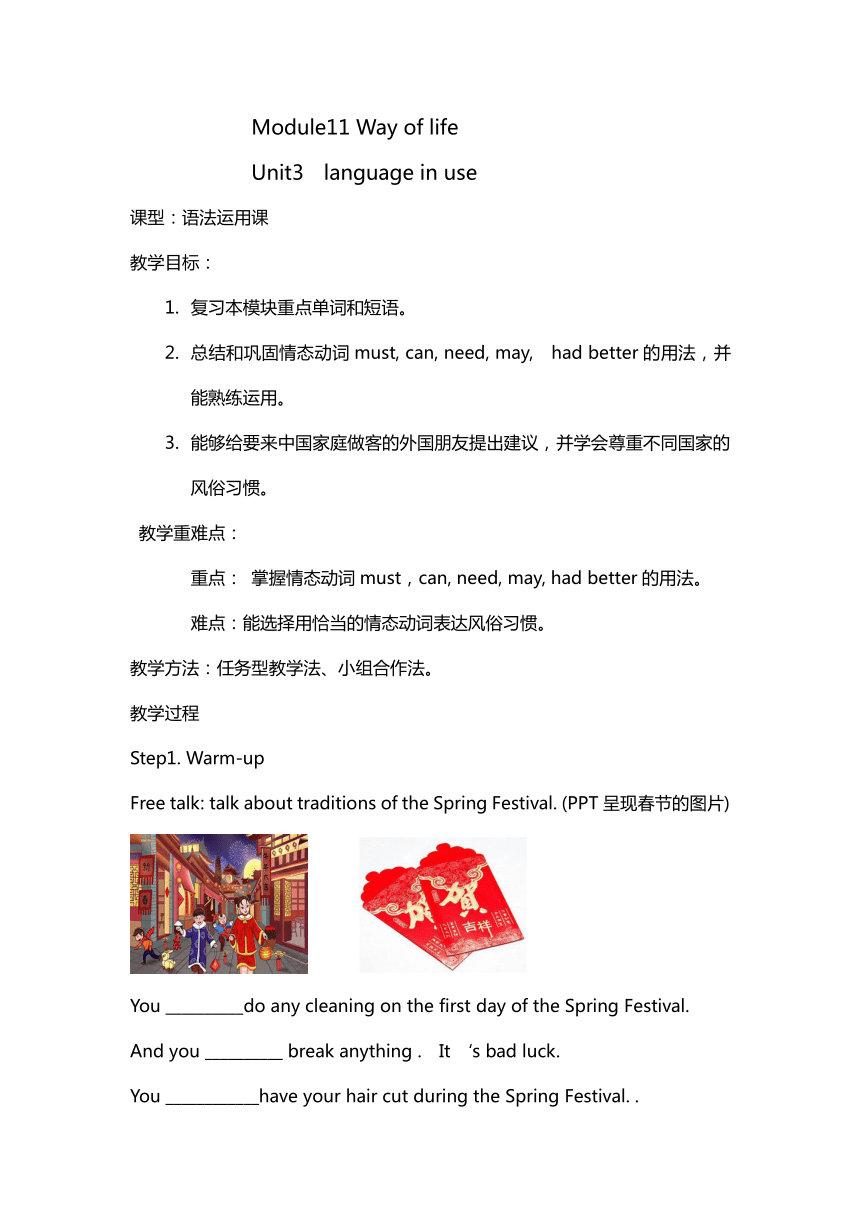
Module11 Way of life Unit3 language in use 课型:语法运用课 教学目标: 复习本模块重点单词和短语。 总结和巩固情态动词must, can, need, may, had better的用法,并能熟练运用。 能够给要来中国家庭做客的外国朋友提出建议,并学会尊重不同国家的风俗习惯。 教学重难点: 重点: 掌握情态动词must,can, need, may, had better的用法。 难点:能选择用恰当的情态动词表达风俗习惯。 教学方法:任务型教学法、小组合作法。 教学过程 Step1. Warm-up Free talk: talk about traditions of the Spring Festival. (PPT呈现春节的图片) You _____do any cleaning on the first day of the Spring Festival. And you _____ break anything . It ‘s bad luck. You _____have your hair cut during the Spring Festival. . You _____ use red paper for hongbao because red means luck. …… Step 2 Grammar Review the use of must ,mustn’t, can, can’t ,need, needn’t ,had better. must (必须)mustn’t (禁止,不准)的用法。 Must 与have to 的区别: Must表示主观因素。Have to 表示客观因素。 can 的用法:表示能力,表示猜测,表示请求或允许。 need (需要)的用法:既可以作情态动词,也可以作实义动词。 Needn’t 表示不需要或不必要。 had better (最好)的用法: had better 意为“最好”,表示建议和劝告,否定式had better not ,后面接动词原形。 Step3. While-task Grammar: Activity 1 Complete the conversations with can or can’t. A: Can you drive a car at the age of seventeen in England B: Yes, we _____. How about in China A: No, we_____. A: Can you open a gift immediately after you receive it in England B: _____. What about in China A: No, we usually don’t. A: Can you push your way onto a bus in England B: _____. How bout in China A: No, we _____either. A: Can you drive on the right-hand side of the road in England B:_____. What about in China A: Yes, we must. Activity2 Complete the sentences with must or must not. School rules 1.You _____be late for school. 2.You _____eat in the library. 3. You _____ride your bike in the playground. 4. You _____do your homework. 5.You _____listen to the teacher. Check the answers by reading the complete sentences. Activity3 Underline the correct words. It is important to know what you must and must not do when you meet people from a different country. You (1) may/must not ask Westerners ”How old are you ” because it is not polite. You (2) might/can know someone well, but you (3) must/need to ask “How much money do you make ” He (4) may/can never speak to you again! In public places, You (5) must/can ask people before you take photos of them, and you (6) must not /might not eat or drink in shops or museums. In some countries you (7) can not /can go into someone’s house with your shoes on. You (8) need not /must not take them off. But in some countries you (9) might/must not wear shoes in the house. Activity 4. Listen to a teenager talking about his life. Check (√)the things he must or nustn’t do. must mustn’t Clean up bedroom once a week Wash up after dinner Stay out after 9 pm Do homework before going out Wash hands before dinner Play music loudly after 10 pm Activity5 listen again. What two ... ...
~~ 您好,已阅读到文档的结尾了 ~~

